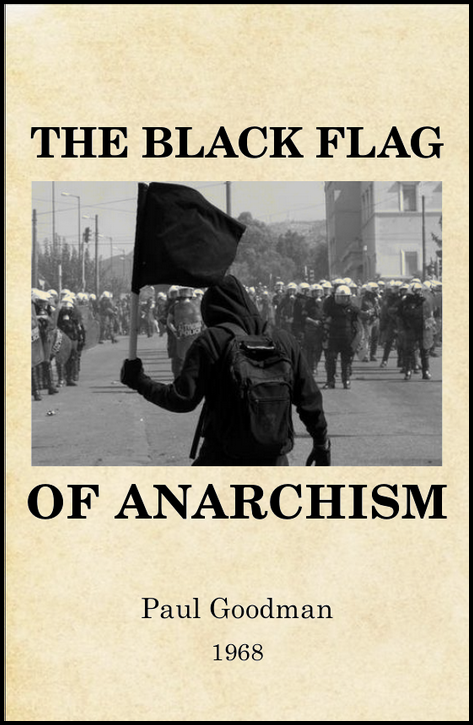C4SS has teamed up with the Distro of the Libertarian Left. The Distro produces and distribute zines and booklets on anarchism, market anarchist theory, counter-economics, and other movements for liberation. For every copy of Paul Goodman’s “The Black Flag Of Anarchy” that you purchase through the Distro, C4SS will receive a percentage. Support C4SS with Paul Goodman’s “The Black Flag Of Anarchy”.
$1.50 for the first copy. $0.75 for every additional copy.
This essay, which first appeared in July 1968, is an influential statement of anarchist principles, a call for political decentralization, and a sympathetic but critical analysis of the New Left and global youth movements in the moment of the May days, the Columbia occupation, the Prague Spring and the crest of the antiwar movement. The essay offers a groundbreaking discussion of the libertarian impulses driving, and the anarchism emerging from, the practice of participatory democracy, college and job-site occupations, anti-establishment protest, counter-culture and nonviolent direct action.
“The wave of student protest in the advanced countries overrides national boundaries, racial differences, the ideological distinctions of fascism, corporate liberalism and communism. Needless to say, officials of the capitalist countries say that the agitators are Communists, and Communists say they are bourgeois revisionists. In my opinion, there is a totally different political philosophy underlying — it is Anarchism. . . . The protesting students are Anarchist because they are in a historical situation to which Anarchism is their only possible response. . . .
“Participatory democracy is grounded in the following social-psychological hypotheses: People who actually perform a function usually best know how it should be done. By and large, their free decision will be efficient, inventive, graceful, and forceful. Being active and self-confident, they will cooperate with other groups with a minimum of envy, anxiety, irrational violence, or the need to dominate. And only such an organization of society is self-improving; we learn by doing, and the only way to educate cooperative citizens is to give power to people as they are. Except in unusual circumstances, there is not much need for dictators, deans, police, prearranged curricula, imposed schedules, conscription, coercive laws. Free people easily agree among themselves on plausible working rules; they listen to expert direction when necessary; they wisely choose pro tem leaders. Remove authority, and there will be self-regulation, not chaos. . . .”
Paul Goodman (1911-1972) was a lonely but extremely influential voice for Anarchist ideas, pacifism and gay liberation, living in New York City and most active in the 1940s, 1950s and 1960s. A novelist, playwright, poet, psychologist and social critic, he published essays in both radical publications like Liberation and Ramparts, and also mainstream outlets like the New York Times Magazine. His essays and his book Growing Up Absurd helped to keep alive the Anarchist tradition during the long 20th century, and to reintroduce New Left radicals to anarchist ideas that helped to articulate and express the principles behind their commitments to radical social transformation, liberation movements and participatory democracy. In an interview with Studs Terkel, Goodman summed up his work by saying “I might seem to have a number of divergent interests – community planning, psychotherapy, education, politics – but they are all one concern: how to make it possible to grow up as a human being into a culture without losing nature. I simply refuse to acknowledge that a sensible and honorable community does not exist.”








